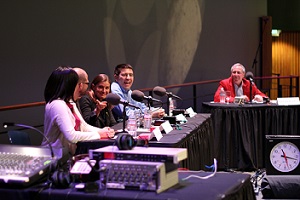Recommended

Four MIT alumni posed these questions, and several others, to each other and to over 100 attendees at last week’s View from the Top event, held at Seattle’s Pacific Science Center.
The June 13 panel brought together five alumni from different decades and disciplines for “Reinventing the World,” a conversation about their work with technology and its delivery around the world.
Asking those tough questions about lasers was Thomas Nugent SM ’99, founder of LaserMotive, who won a 2009 NASA competition to deliver power wirelessly to robotic vehicles. Margaret Orth SM ’93, PhD ’01, founder of International Fashion Machines, presented some of her work that integrated fashion and wearable technology. Cliff Schmidt ’93 displayed the Talking Book that he developed as founder and head of Literacy Bridge, which delivers basic educational technology to developing communities. Yun-Ling Wong ’04, a senior program officer at the Gates Foundation, addressed the challenges of mediating the demands of both developed and developing countries in finding solutions to global problems.
John Castle ’61, ScD ’64, a lecturer in entrepreneurship at the University of Washington, moderated the discussion, organized by MIT’s Office of Alumni Education.
The Seattle event gave attendees, who ranged from veteran Puget Sound Club members to young alums to prospective students and friends, a lively discussion among four professionals who are passionate about what they do. It also offered attendees ample time for questions, whether during the cocktail hour beforehand, the panel itself, or the desert reception afterward.
Even the panelists took turns reflecting on each other’s work.
After hearing from Nugent and narrating her own journey through wearable computing via an IMAX screen in the theater, Maggie Orth described her new ideas on technological minimalism. “I am from MIT, so I am not a Luddite,” she said. "It’s not necessarily less technology that I want, but smarter technology.”
After hearing about Schmidt's Talking Book, which has improved health and agriculture benchmarks for illiterate populations in Ghana by as much as 100%, Ling Wong explained just how hard such a project is for ambitious non-profits in the United States who want to affect the world.
“All lives have equal value, and technology can help us get there, but how we actually save lives is much more complicated,” said Wong. “Technology [can’t work] without advocacy, without government support, and without understanding a culture…the problems we’re trying to solve are hard ones…and it takes many sorts of people to make this happen.”
Castle, who introduced each panelist, remarked how all four alumni have essentially sought to answer one question through their work: How can technology change people’s behavior?
“For them, it’s not just about the technology, it’s about all of the things technology does and how it affects people in one way or another. Technology influences people’s choices, but in some ways it can push them in directions they may not want to go.”







